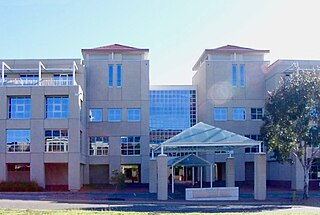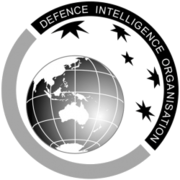
The Joint Intelligence Committee (JIC) is an interagency deliberative body of the United Kingdom responsible for intelligence assessment, coordination, and oversight of the Secret Intelligence Service, Security Service, GCHQ, and Defence Intelligence. The JIC is supported by the Joint Intelligence Organisation under the Cabinet Office.

The Australian Secret Intelligence Service is the foreign intelligence agency of Australia, tasked with the covert collection of information overseas through personal contacts and other means of human intelligence. It is part of the Australian Intelligence Community and is also responsible for counter-intelligence and liaising with the intelligence agencies of other countries. ASIS was formed in 1952 but its existence remained secret within much of the government until 1972. ASIS is comparable to the American CIA and the British MI6.

The Office of National Assessments (ONA) was an Australian statutory intelligence agency established by the Office of National Assessments Act 1977 as an independent statutory body directly accountable to the Prime Minister of Australia as a portfolio agency of the Department of the Prime Minister and Cabinet. ONA provided all-source assessments on international political, strategic and economic developments to the Prime Minister and the National Security Committee of Cabinet. ONA also played a coordination role in the Australian Intelligence Community through evaluating foreign intelligence products, convening the National Intelligence Coordination Committee, and developing relationships with intelligence agencies around world.

Defence Intelligence (DI) is an organisation within the United Kingdom intelligence community which focuses on gathering and analysing military intelligence. It differs from the UK's intelligence agencies in that it is an integral part of a government department – the Ministry of Defence (MoD) – rather than a stand-alone organisation. The organisation employs a mixture of civilian and military staff and is funded within the UK's defence budget. The organisation was formerly known as the Defence Intelligence Staff (DIS), but changed its name in 2009.

The Defence Strategic Policy and Intelligence Group (SP&I) of the Australian Government Department of Defence is responsible for defence diplomacy, strategic policy, international security, and military intelligence co-ordination and advice to the Prime Minister of Australia, Minister for Defence, Secretary of the Department of Defence, and Chief of the Defence Force. The Defence Strategic Policy and Intelligence Group is led by the Deputy Secretary for Strategic Policy and Intelligence and comprises three policy divisions and two intelligence agencies.
The Parliamentary Joint Committee on Intelligence and Security (PJCIS) is a joint committee of the Parliament of Australia which oversees Australia's primary agencies of the Australian Intelligence Community: Australian Security Intelligence Organisation (ASIO), the Australian Secret Intelligence Service (ASIS), the Australian Signals Directorate (ASD), the Defence Intelligence Organisation (DIO), the Australian Geospatial-Intelligence Organisation (DIGO), and the Office of National Assessments (ONA).
The Australian Intelligence Community (AIC) and the National Intelligence Community (NIC) or National Security Community of the Australian Government are the collectives of statutory intelligence agencies, policy departments, and other government agencies concerned with protecting and advancing the national security and national interests of the Commonwealth of Australia. The intelligence and security agencies of the Australian Government have evolved since the Second World War and the Cold War and saw transformation and expansion during the Global War on Terrorism with military deployments in Afghanistan, Iraq and against ISIS in Syria. Key international and national security issues for the Australian Intelligence Community include terrorism and violent extremism, cybersecurity, transnational crime, the rise of China, and Pacific regional security.
The Joint Intelligence Organisation (JIO) was an Australian government intelligence agency that existed between 1969 and 1990 and which was responsible for the analysis of defence and foreign intelligence.
The Australian Defence Organisation (ADO) is composed of the armed forces of the Commonwealth of Australia, the Australian Defence Force (ADF), and the Australian Public Service government department, the Department of Defence which is composed of a range of civilian support organisations.
The Australian Defence Organisation (ADO) is composed of the armed forces of the Commonwealth of Australia, the Australian Defence Force (ADF), and the Australian Public Service government department, the Department of Defence which is composed of a range of civilian support organisations.
The Defence Intelligence Fusion Centre (DIFC) is based at RAF Wyton in Cambridgeshire. Largely created from the staff of the National Imagery Exploitation Centre and then known for several years as the Defence Geospatial Intelligence Fusion Centre, it can trace its history back to clandestine reconnaissance operations at the beginning of the Second World War by Sydney Cotton on behalf of MI6 and then MI4, and the formation of the Allied Central Interpretation Unit at RAF Medmenham.
The Royal Commission on Intelligence and Security (RCIS), also known as the First Hope Commission, was a Royal Commission established on 21 August 1974 by Prime Minister of Australia Gough Whitlam to reach findings and make recommendations as to the Australian Intelligence Community.
The Government of the United Kingdom maintains several intelligence agencies that deal with secret intelligence. These agencies are responsible for collecting, analysing and exploiting foreign and domestic intelligence, providing military intelligence, and performing espionage and counter-espionage. Their intelligence assessments contribute to the conduct of the foreign relations of the United Kingdom, maintaining the national security of the United Kingdom, military planning, public safety, and law enforcement in the United Kingdom. The four main agencies are the Secret Intelligence Service, the Security Service (MI5), the Government Communications Headquarters (GCHQ) and Defence Intelligence (DI). The agencies are organised under three government departments, the Foreign Office, the Home Office and the Ministry of Defence.

The National Security Committee (NSC), also known as National Security Committee of Cabinet, is the peak decision-making body for national security and major foreign policy matters in the Australian Government. It is a committee of the Cabinet of Australia, though decisions of the NSC do not require the endorsement of the Cabinet itself.

The National Intelligence Coordination Committee (NICC) is a peak intergovernmental officials-level body of the Government of Australia responsible for the development and co-ordination of the Australian Intelligence Community in accordance with the National Security Committee of Cabinet. The NICC is chaired by the Director-General of the Office of National Intelligence.
The Office of National Intelligence (ONI) is an Australian statutory intelligence agency responsible for advising the Prime Minister and National Security Committee, the production of all-source intelligence assessments, and the strategic development and enterprise management of the National Intelligence Community. The ONI is directly accountable to the Prime Minister of Australia as a portfolio agency of the Department of the Prime Minister and Cabinet.






